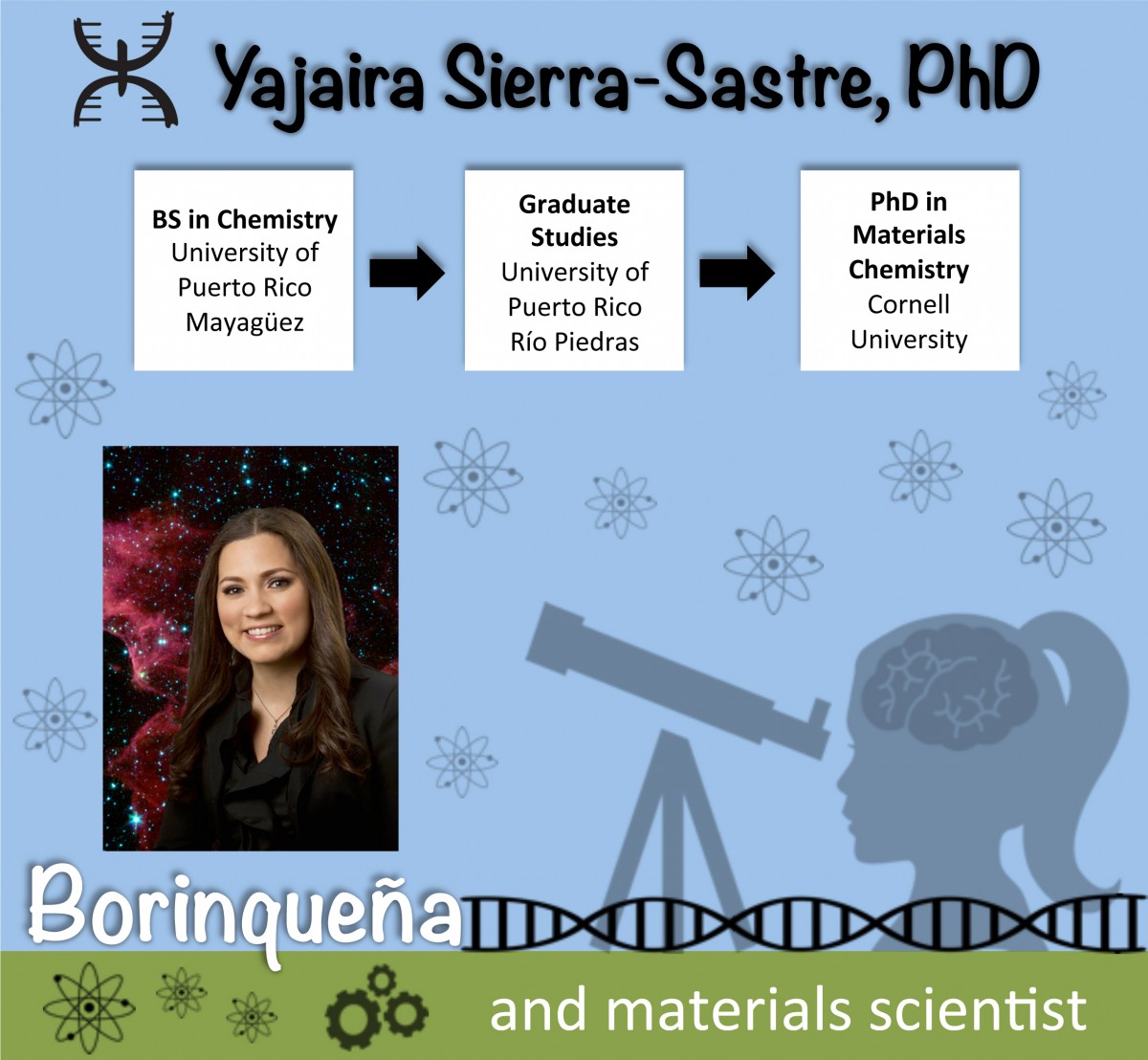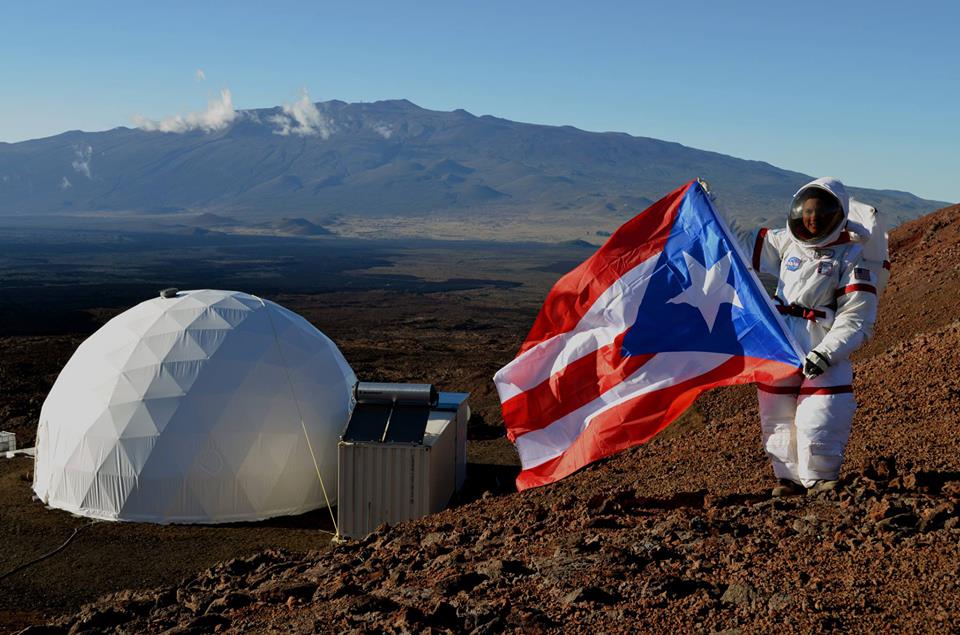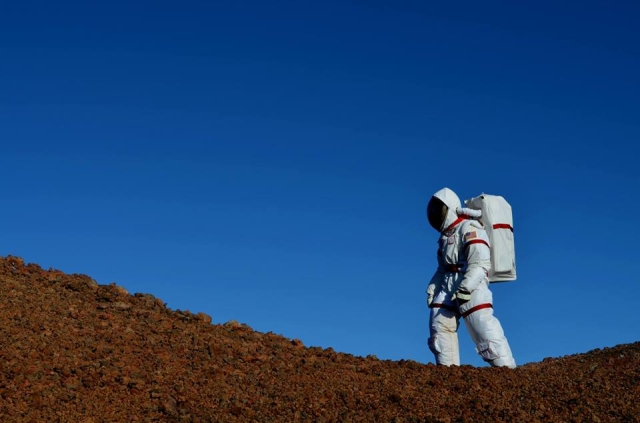Yajaira Sierra-Sastre: I am a Borinqueña and Materials Scientist
Submitted by Greetchen Díaz-Muñoz on
Dr. Yajaira Sierra-Sastre is a materials science and nanotechnology scientist, who dreams of being the first Puerto Rican astronaut. To achieve her goal, she applied to the astronaut candidate program at NASA, and although this time Dr. Sierra Sastre was not selected, she was one of the highest scoring applicants. Yajaira is an exemplary Borinqueña. Recently, she was selected among 700 applicants to be part of a simulated mission to Mars. I invite you to know about her beginnings and the road she has traveled to achieve her goals.
Greetchen: Where were you born and raised? Where do you currently live and work?
Yajaira: I was born in Guayama and was raised in the town of Arroyo. Now I live in Ithaca, New York. I am currently teaching General Chemistry laboratories at the State University of New York Cortland (SUNY Cortland).
Greetchen: What was the most important event in your life that sparked your interest in science?
Yajaira: There were several events in my life that made me become interested in science. I was about five years old when my dad woke me up in the middle of the night to gaze at the stars from our home’s backyard. I also remember a day when my family was at the beach and my mother and I were using a magnet to pull magnetite out of the sand. Moments like those sparked in me the curiosity to understand the natural world. I was fascinated by documentaries of the first man on the moon and loved to read the science section of the newspaper. However, I think that what greatly influenced my appreciation for science was my participation in science fairs when I was in elementary and middle school.
Greetchen: Why did you decide to study chemistry and materials science?
Yajaira: The teaching excellence of Professor Ivelisse Padilla, my freshman year Chemistry professor at the University of Puerto Rico at Mayaguez, was a major determinant in my decision to continue my bachelor’s degree in Chemistry.
My interest for research in materials chemistry and nanotechnology began in the summer of 2002 during a research internship at the University of Stanford. During that summer I worked in the characterization of materials that were being manufactured for surface coating. It was then that chemistry took on a different meaning for me because I experienced how it was possible to manipulate these molecules, apply them to a surface on a controlled manner and impart them with unique properties that were different from the initial material. This experience marked the beginnings of my career as a nanoscientist.
However, it was Professor Carlos Cabrera at the University of Puerto Rico at Río Piedras that guided my first steps in research. Before I started my doctoral studies at Cornell, I took graduate courses at Río Piedras and I worked at the NASA Research Center Advanced Nanoscale Materials (CANM), where I learned various techniques to characterize nanomaterials with applications for space exploration.

Greetchen: Until recently you were on a simulated mission to Mars. From your experience, which do you think are the difficulties that women would experience in the Red Planet? And what about Puerto Rican women?
Yajaira: I would say that instead of experiencing difficulties, the Red Planet would be a paradise in terms of equal access for women in the fields of science and technology. Mars is an extreme environment and it will require that the crew, regardless of its gender composition, work as a team for their survival and the success of the mission. However, I don’t think a spacecraft will have all of the space necessary to carry all of the clothes, heels, purses and lipstick that many Boricuas like to use daily!

Dr. Yajaira Sierra-Sastre in Hawaii during the simulated mision to the Red Planet. Photo: Sian Proctor
Greetchen: Have you had any obstacles during your career that you can say were due because you are a woman and/or Hispanic? How did you face them?
Yajaira: The major obstacle I had to face was at the beginning of college and it was my difficulty speaking English. During college, I suffered a lot with professors that would teach engineering and science courses in English. Sadly, my inability to communicate in English closed some doors at the beginning of my career. That was the main reason why I decided to continue graduate studies in the United States. I wanted to be bilingual and prove myself that I could achieve success in my career.
Greetchen: I know you have been a mentor and that surely you have received mentorship during different stages of your career. What can you tell us about those experiences?
Yajaira: Being a mentor is my passion. I had good scientific mentors at all stages of my career, but there were moments when I really needed a good mentor. For that reason I think that mentoring is one of the best investments that we can do for the future generations of scientists. Every time I go back to the island, I make it a point to visit schools and talk to the students about professional development, internship or camp opportunities, and the importance of a mentoring network, among other topics. I have worked with students in Puerto Rico to translate scientific literature and as a consultant on science fair projects. Mentorship happens from person to person, at the town square, under the shade of a tree at school, at the mall, through email, phone or Skype.
Greetchen: What advice can you give Borinqueñas that wish to pursue a career in science?
Yajaira: Be bold, brave, determined and strategic. Find mentors that encourage you and constantly remind you that can do achieve your goals. Safeguard your heart while pursuing your university career because a relationship with the wrong person or at the wrong time could negatively impact your professional goals. Immerse yourself without fear into the research opportunities that come up, even if they are on the other side of the world. Don’t isolate yourself. Become part of professional organizations for women and find the support that you need. Do not compare yourself to anyone because you are unique! Know the skills and personality traits that distinguish you from the rest of the work force. This also entails to be faithful to your passions.

"Use your unique value, live your dreams and make a difference."- Yajaira Sierra-Sastre
If you wish to know more about Dr. Sierra-Sastre visit her profile at CienciaPR and visit the following links:
Puerto Rican women aspire to be the first in space
They’ll be cooking up a Mars menu that’s out of this world
Puerto Rican women aspire to be first “Boricua” astronaut (VIDEO)
Puerto Rican Scientist works hard to visit Mars
A “Boricua” with space citizenship
Know more about the author, Greetchen Díaz and follow her on Twitter (@GreetDíaz). Reyna Martínez (@remadel) contributed to this story.









